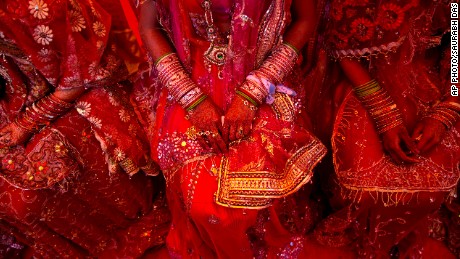In India, a staggering 94% of rapes are committed by perpetrators known to the victim but hidden from view is a huge number of women with no legal road -- those raped by their husbands.
The number of women sexually assaulted by their husbands is 40 times the number of women attacked by men they don't know. Yet, marital rape is legal.
The Criminal Law (Amendment) Act, 2013, states: "Sexual intercourse or sexual acts by a man with his own wife, the wife not being under fifteen years of age, is not rape."
And the law remains despite challenges from individuals and organizations.
Last month, an Indian woman who claimed she was brutally raped by her husband requested the court to acknowledge marital rape. But her pleas were dismissed because it was "an individual case."
"It's hard to register a case of sexual assault against a husband," says Supreme Court lawyer Karuna Nundy to CNN. "The fact that marital rape is legal makes it even harder."
Lawmakers also presented a report to parliament in 2013 opposing the view that such assaults should be criminalized.
"If marital rape is brought under the law, the entire family system will be under great stress," the report said.
The Protection of Women from Domestic Violence Act, passed in 2005, enables women to access civil remedies for domestic violence including sexual abuse.
"In cases that are few and far between, lawyers are starting to use sections 354 and 377 when a wife wants to prosecute her husband for sexual abuse," says Nundy.
Section 354 punishes "assault or criminal force to a woman with intent to outrage her modesty." And section 377 penalizes "carnal intercourse against the order of nature" -- a law that also subsequently reprimands homosexuality.
But rape within marriage is not explicitly acknowledged.
The Justice Verma committee, set up the Indian government, submitted a report recommending legal reforms to reduce violence against women. Although some changes were implemented, the suggestion to make marital rape illegal was disregarded.
Some point out that the law does not favor all men.
"For instance if you look at section 375, the rape of a man or transgender is legal," says Nundy.
"There's a gender issue behind that. And the gender issue is that you're a lesser man if you are raped." She says that such offenses are therefore rarely prosecuted.
However, India is not the only country where the husband is given such precedence. For example, as the graphics above illustrate, in Singapore, a man is not guilty of rape if the victim is his spouse. And in Malta, a violent abduction can be dismissed if the perpetrator marries his victim, with consent.
Also, as Nundy points out, in England, it was not until 1991 that marital rape became punishable by law, and 1982 in Scotland.
But there are many reasons given as to why its legality persists in India. "... It comes from a sort of Victorian, patriarchal morality. And misogynists in parliament today have failed to get rid of it," says Nundy.
Some believe sex is perceived differently. "It's because we don't understand sex," says psychologist Deepak Kashyap, who runs a private practice in Mumbai.
"India is not able to differentiate between sex for purpose and sex for pleasure; sex should only be for purpose. And you are duty bound to give children and you are duty bound to have sex with your husband."
A study of how men perceive their gender roles also found that the majority felt they could overpower women. Although it is pointed out that the sample is not representative of all men in India, 75% of those questioned expected their partners to agree to sex.
A recent BBC interview with one of the attackers involved in the gang rape and murder of a student on a bus in Delhi in 2012, a notorious incident that led to a mass outcry, also revealed shocking patriarchal attitudes towards the crime.
Kashyap argues that Indians have misinformed discussions about sex.
"Firstly, we have no sex education. And if we did, God forbid if we went and told them [students] that it's about pleasure as well and it's not just for purpose... Sex education has been opposed vehemently by a lot of politicians."
"In some schools under the Central Board of Secondary Education (CBSE), there was a provision for it [sex education] but there were a lot of concerns where some people were not comfortable with it," says high school teacher Ratna Mahapatra, 45, from Kolkata.
In Kashyap's day-to-day counselling of married couples in India, he finds that they hesitate in being open with their feelings.
"Well, the general kind of sense that I get is that women are not able to express their bodies as much as a man and their desires and what they would like, which are not normal [in their view]."
And services like his are few and far between. "The ones that are available are unregulated, very expensive and seen as an anomy. You have to be mad to go to a psychologist."
Some women in India take advantage of the digital age. "Everything I learnt [about sex or sexual relationships] is from online," says Preethi Ramamoorthy, 24, from Chennai.
"The internet is an amazing resource -- an ocean of knowledge," says Ruchita Gopal, 24, from Mumbai. "That's my primary source for any kind of information on the subject."
And patriarchal attitudes have existed from their childhoods.
"[A marriage is] a social construction people in India are forced to undertake," says Ramamoorthy. "And my views are being perpetrated by my parents themselves."
"It is perceived that the husband has full right to be physical, in whichever way he feels like, and the wife has agreed to marry knowing fully well that she has to give in to the demands of her husband," says Mahapatra.
"However, it would be wrong to assume that there is marital rape in all marriages," she adds.
Mahapatra also believes the internet should be used to promote change. "Women should be taught to be more assertive. Social welfare advertisements and documentary films should be telecast in social media."
For legal reform to take place, Nundy believes that pressure should be applied to those in power.
"I think if there's enough pressure on the government and the political entireties that support it, and if they realize that there's too much of a political cost, whether it's in terms of women's and men's votes, or a just court order."
Kashyap wants to see today's youth better informed. But he also holds the view that it would take something drastic, such as the provoking gang rape, in order to spur change. And even then, there's a long wait.
"Social changes don't happen overnight. They take generations to come."
(CNN)
ANN.Az
Follow us !











